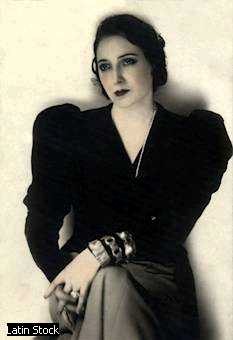- Juana de Ibarbourou
Infobox Person
name =Juana de Ibarbourou

caption = Uruguayan writer
birth_date = birth date|1892|3|8|mf=y
birth_place =Melo ,Uruguay
dead = dead
death_date = death date and age|1979|7|15|1892|3|8|mf=y
death_place =Montevideo ,Uruguay Juana de Ibarbourou, also known as Juana de América, (1892–1979) was a
Uruguay anpoet of Galician background. [ [http://www.galiciaaberta.com/portal/site/galiciaAberta/menuitem.6cb573d888caf33664561da1f03900a0/Juana An uruguaian poet of Galician soul] ] She was one of the most popular poets ofSpanish America . Her poetry, the earlier of which is often highly erotic, is notable for her identification of her feelings with the nature around her.Biography
Born Juana Fernández Morales on March 8, 1895, near
Melo , Cerro Largo, Uruguay. The date of Juana's birth is often given as March 8, 1895, but according to a local state civil registry signed by two witnesses, the year was actually 1892. Juana began studies at theJosé Pedro Varela school in 1899 and moved to a religious school the following year, and two public schools afterwards. In 1909, at 17 years old, she published a prose piece "Derechos femeninos" (female rights), beginning a lifelong career as a feminist.Married Captain Lucas Ibarbourou in a civil ceremony June 28, 1913, and had one child named Julio César Ibarbourou (b. 1917). In 1918, Juana moved to
Montevideo with her family. Juana and Lucas were married in a religious ceremony June 28, 1921 in the Church of Our Lady of Perpetual Aid (la iglesia de Nuestra Señora del Perpetuo Socorro). Lucas Ibarbourou died January 13, 1942.Juana de Ibarbourou died July 15, 1979 in Montevideo, Uruguay.
Poetry and philosophy
Juana de Ibarbourou was a feminist, naturalist, and pantheist.
Feminism
Juana de Ibarbourou was an early Latin American feminist. Ibarbourou's feminism is evident in poems such as "La Higuera", in which she describes a fig tree as more beautiful than the straight and blooming trees around it, and "Como La Primavera", in which she asserts that authenticity is more attractive than any perfume. Also, in "La Cita", Ibarbourou extols her naked form devoid of traditional ornamentation, comparing her natural features to various material accessories and finding in favor of her unadorned body.
Common themes
Nature imagery and eroticism define a great body of Ibarbourou's poetry.
Death
Ibarbourou's depiction of death in her poetry was not consistent throughout her body of work. In "La Inquietud Fugaz", Ibarbourou portrayed a binary, final death consistent with Western tradition. In "Vida-Garfio" and "Carne Inmortal", however, Ibarbourou describes her dead body giving rise to plant life, allowing her to live on.
In "Rebelde", one of Ibarbourou's most richly constructed poems, Ibarbourou details a confrontation between herself and Charon, the ferryman of the River Styx. Surrounded by wailing souls on the boat passage to the underworld, Ibarbourou defiantly refuses to lament her fate, acting as cheerfully as a sparrow. Although Ibarbourou does not escape her fate, she wins a moral victory against the forces of death.
Like most poets, Ibarbourou nursed an intense fear of death. Though it is easy to surmise this from her poetry, she states so explicitly in the first line of "Carne Inmortal."
Published works
* "Lenguas de diamante" (1919)
* "Raza salvaje" (1920)
* "La rosa de los vientos" (1930)
* "Oro y tormenta" (1956), biblical themes reflect her preoccupation with suffering and death.
* "Chico Carlo" (1944) contains her memoirs.
* "Obras completas" (3rd ed. 1968).Awards and honors
* Medal of Public Instruction of Venezuela (1927)
* consecrated "Juana de América" in the Salon of the Lost Steps of the Legislative Palace of Montevideo (1929)
* Gold Medal of Francisco Pizarro (Peru, 1935)
* Order of the Condor of the Andes (Bolivia, 1937)
* Order of the Sun (Peru, 1938)
* President of the PEN Club of Uruguay (1941)
* Cruise Order of the Sun (Brazil, 1945) (Orden Crucero del Sur)
* Cross of the Commander of the Grand Humanitarian Prize of Belgium (1946)
* National Academy of Letters (Uruguay, 1947)
* Gold Medal from the Ministry of Public Instruction (Uruguay, 1948)
* Carlos Manuel Céspedes Order (Cuba, 1951)
* Named "Woman of the Americas" by the American Women's Union of New York (1953)
* Eloy Alfaro Order (Ecuador, 1953)
* National Grand Prize for Literature (Uruguay, 1959)
* Order of Quetzal (Guatemala, 1960)
* Plaza in La Paz, Bolivia named for Juana de Ibarbourou (1965)
* Branch of the Juana de Ibarbourou Library and House of Culture opened in home town of Melo (1977)
* La Fiesta de los Milagros(1943)Notes and References
Works cited
* Sylvia Puentes de Oyenard. "Apuntes para una Biobibliografia de Juana de Ibarbourou." Foreword. "Obras Escogidas." By Juana de Ibarbourou, ed. Sylvia Puentes de Oyenard. México, D.F.: Editorial Andres Bello, 1998.
Research resources
* [http://www.oac.cdlib.org/findaid/ark:/13030/tf5p3004rx Juana de Ibarbourou Papers, 1915-1960] (5 linear ft.) are housed in the [http://library.stanford.edu/depts/spc/spc.html Department of Special Collections and University Archives] at [http://library.stanford.edu/ Stanford University Libraries]
Wikimedia Foundation. 2010.
